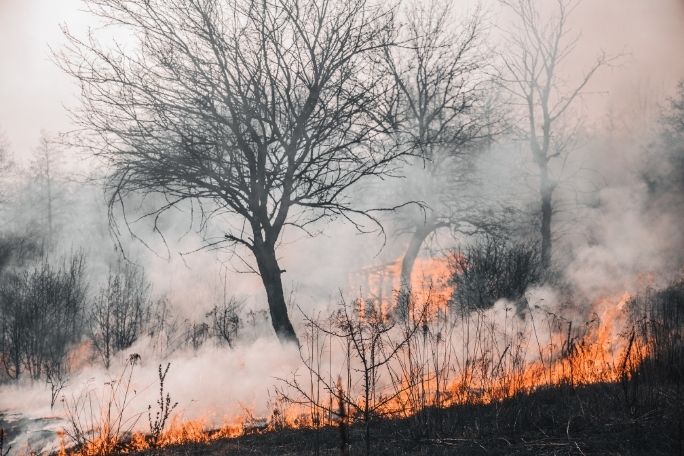Lesson summary
Students explore the role of traditional fire management practices in preventing destructive bushfires. They begin by thinking about the costs of bushfires on a range of factors, before exploring traditional fire management practices and looking at how these are less damaging to our environment. They read articles about these practices and share their findings in groups. Finally, they create a poster to describe how traditional fire management practices could benefit flora and fauna species affected by the Black Summer bushfires.
Learning intentions:
Students will...
- understand what traditional fire management practices are
- recognise how big, uncontrolled bushfires - such as those experienced during the Black Summer - can impact native flora and fauna species
- recognise the benefits of introducing traditional fire management practices to people and landscapes.
Success criteria:
Students can...
- read, analyse and communicate key ideas from an article
- work independently and collaboratively
- participate in class discussions
- conduct and communicate research
- produce a poster.
Lesson guides and printables
Lesson details
Curriculum mapping
Australian Curriculum content descriptions:
Year 7 Science:
- People use science understanding and skills in their occupations and these have influenced the development of practices in areas of human activity (ACSHE121)
- Scientific understanding, including models and theories, is contestable and is refined over time through a process of review by the scientific community (ACSHE157)
- Summarise data, from students’ own investigations and secondary sources, and use scientific understanding to identify relationships and draw conclusions based on evidence (ACSIS130)
- Communicate ideas, findings, and evidence-based solutions to problems using scientific language, and representations, using digital technologies as appropriate (ACSIS133)
Year 9 Science:
- People use scientific knowledge to evaluate whether they accept claims, explanations or predictions, and advances in science can affect people’s lives, including generating new career opportunities (ACSHE160)
- Science knowledge can develop through collaboration across the disciplines of science and the contributions of people from a range of cultures (ACSHE223)
- Use knowledge of scientific concepts to draw conclusions that are consistent with evidence (ACSIS170)
- Communicate scientific ideas and information for a particular purpose, including constructing evidence-based arguments and using appropriate scientific language, conventions, and representations (ACSIS174)
Syllabus outcomes: SC4-13ES, SC5-12ES, SC4-7WS, SC4-9WS, SC5-13ES, SC4-17CW, SC5-7WS, SC5-9WS
General capabilities: Critical and Creative Thinking, Ethical Understanding, Literacy
Cross-curriculum priority:
- Aboriginal and Torres Strait Islander Histories and Cultures OI.2, OI.3, OI.9
- Sustainability OI.2., OI.8. OI.9
Relevant parts of Year 7 Science achievement standards: Students predict the effect of human and environmental changes on interactions between organisms. They describe situations where scientific knowledge from different science disciplines and diverse cultures has been used to solve a real-world problem. Students summarise data from different sources and communicate their ideas, methods, and findings using scientific language and appropriate representations.
Relevant parts of Year 9 Science achievement standards: Students describe social and technological factors that have influenced scientific developments and predict how future applications of science and technology may affect people’s lives. They use appropriate language and representations when communicating their findings and ideas to specific audiences.
This lesson is part of the wider unit of work Beyond the Bushfires – Secondary
Time required: 100+ mins
Level of teacher scaffolding: Medium – facilitate class discussions, oversee group activities, lead students in research tasks and in a gallery walk
Resources required
- Articles:
- The Conversation – The world’s best fire management system is in northern Australia, and it’s led by Indigenous land managers
- The Conversation – Australia, you have unfinished business. It’s time to let our ‘fire people’ care for this land
- The Conversation – Indigenous expertise is reducing bushfires in northern Australia. It’s time to consider similar approaches for other disasters
- The Conversation – Fighting fire with fire: Botswana adopts Indigenous Australians’ ancient burning tradition
- The Conversation – Our land is burning, and western science does not have all the answers
- A device capable of presenting a video to the class
- Devices for students to access online articles – one per student
- Poster making materials
- Scientific Poster Rubric
- Student Worksheets – one copy per student
Skills
This lesson is designed to build students’ competencies in the following skills:
- Communication
- Critical thinking
- Cultural understanding
- Ethical understanding
- Problem solving
- Collaboration
Additional info
In partnership with The Conversation, the Beyond the Bushfires series brings the words of scientists who are actively involved in research and science communication into classrooms throughout Australia. Students will explore evidence-based research embedded in the context of real-world practice.
Additional thanks to the Ian Potter Foundation, John T Reid Charitable Trusts and The Myer Foundation, for generously supporting the development of these lessons.


Welcome back!
Don't have an account yet?
Log in with:
By signing up to Cool.org you consent and agree to Cool's privacy policy to
store, manage and process your personal information. To read more, please see
our privacy policy here(Opens in new tab).
Create your free Cool.org account.
Many of our resources are free, with an option to upgrade to Cool+ for premium content.
Already have an account?
Sign up with:
By signing up to Cool.org you consent and agree to Cool's privacy policy to
store, manage and process your personal information. To read more, please see
our privacy policy here(Opens in new tab).